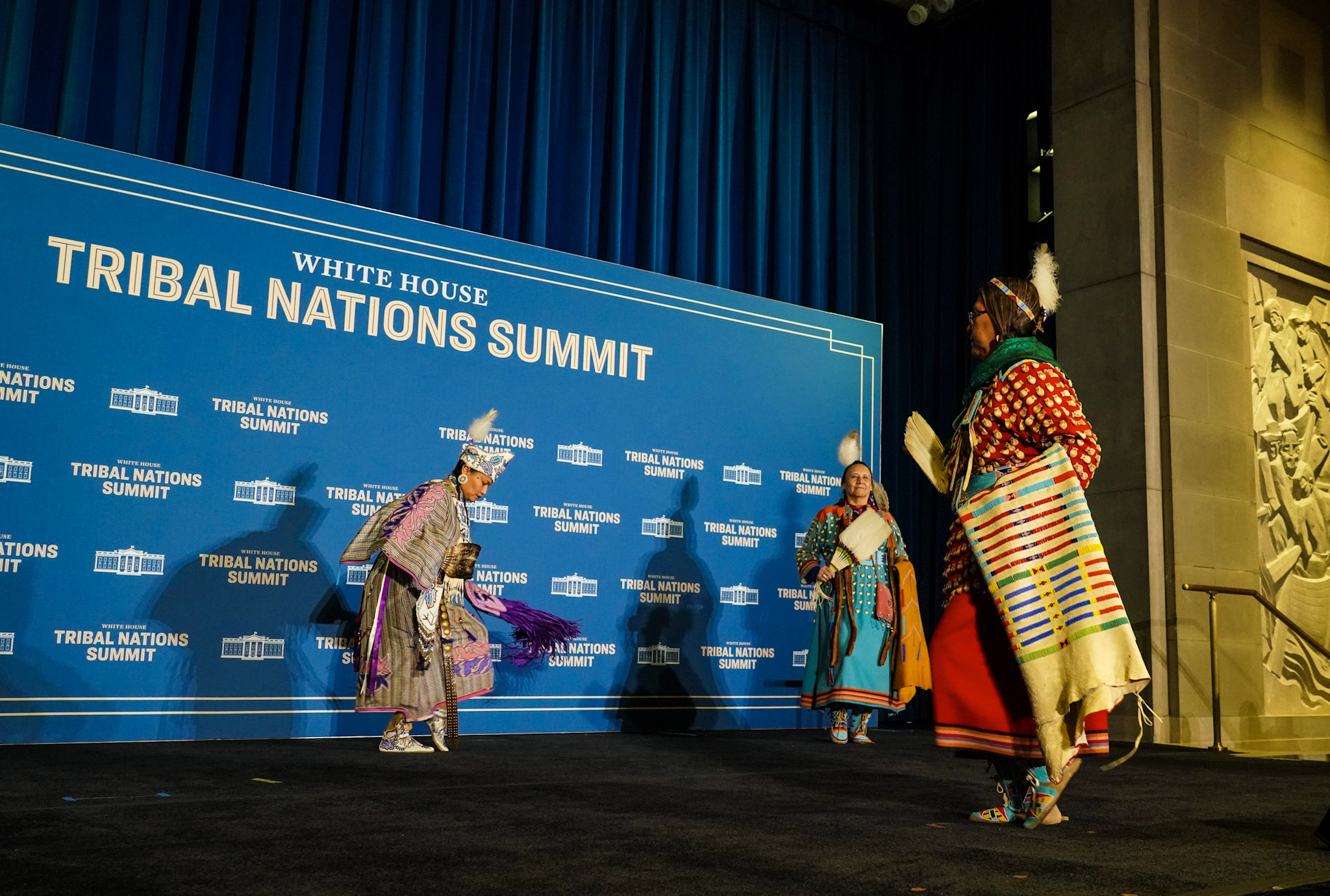Indianz.Com >
News > ‘The time is now’: Lumbee Tribe sees movement on federal recognition bill
 Federal government employees perform at the White House Tribal Nations, held at the main building of the Department of the Interior in Washington, D.C., on December 9, 2024. Photo: U.S. Department of the Interior
Federal government employees perform at the White House Tribal Nations, held at the main building of the Department of the Interior in Washington, D.C., on December 9, 2024. Photo: U.S. Department of the Interior
‘The time is now’: Lumbee Tribe sees movement on federal recognition bill
Monday, December 16, 2024
By Acee Agoyo
Indianz.Com
A controversial bill to extend federal recognition to the
Lumbee Tribe is moving forward on Capitol Hill amid ongoing opposition in Indian Country.
The
U.S. House of Representatives is set to approve
H.R.1101, the Lumbee Fairness Act, this week, according to the
Majority Leader’s calendar. The bill is advancing even though no hearing has taken place during the
118th Congress, which is set to conclude in just a matter of days.
That means the
U.S. Senate would have to move even more quickly in order for the Lumbees to gain federal recognition while Democratic President Joe Biden, who has supported the legislation, is still in office. No such bill has ever gotten over the finish line ever since the North Carolina group has stepped up efforts to establish a legal relationship with the United States.
“The time is now to bring the Lumbee into the full guarantees of government-to-government relations promised by the United States Constitution,” Chairman John L. Lowery said in a
news release last week, in which he blamed the
Eastern Band of Cherokee Indians, also based in North Carolina, for opposing the bill.

Indianz.Com
What Lowery didn’t address was a controversy that erupted into public view shortly before the Thanksgiving holiday.
Sen. Thom Tillis (R-North Carolina), the tribe’s main proponent in the Senate, confirmed for the first time that he has been holding up an unrelated bill to protect the site of the
1890 Wounded Knee Massacre — all because he hasn’t been able to get the Lumbee Fairness Act going in his chamber.
“In the coming weeks and months, I’m going to continue to highlight the individuals, the lobbyists, the tribal leaders, and the groups that are part of this web that are preventing the Lumbees from getting the recognition that they have deserved for nealry 130 years,”
Tillis said in a threat from the Senate floor on
November 21.
Lowery also did not speak to the
numerous tribal governments and tribal organizations that have been opposing federal recognition bills. On Friday, the
Inter-Tribal Council of the Five Civilized Tribes reminded the public that some of the largest tribal nations in the U.S. have called on the Lumbees to go through the
Bureau of Indian Affairs (BIA) for acknowledgment of their claimed status.
According to the 2022 resolution approved by leaders of the Cherokee Nation, the Chickasaw Nation, the Choctaw Nation, the Muscogee Nation and the Seminole Nation
“it is irresponsible for any governmental body, including the United States Congress, to bypass this process in favor of certain groups claiming to be tribal governments.”
The resolution, which has not been rescinded, singles out the “Lumbee Tribe” as one of several groups that are seeking federal or even state recognition without going through the
Office of Federal Acknowledgment at the BIA.
Back in 1987, the Lumbees submitted a petition to the BIA in hopes of proving that they are an Indian tribe. The “Federal Recognition” section of the Lumbee Fairness Act in fact notes that they have been “designated as petitioner number 65 by
the Office of Federal Acknowledgment” at the BIA.
The BIA, however, never took action because the administration of then-president George H.W. Bush — a Republican — said a federal law commonly known as the
Lumbee Act of 1956 barred consideration of the petition. The statute has been viewed as “terminating” or “forbidding” a federal relationship with the “Lumbee Indians of North Carolina.”

Indianz.Com
The administration of former president Barack Obama — a Democrat — reversed course,
first by
supporting legislative recognition for the Lumbees, a significant shift in federal policy. Additionally, the
first Native person to
serve as Solicitor at the
Department of the Interior issued a
legal opinion in 2016 that cleared the way for the Lumbees to go through the OFA process.
Despite major changes in their favor, the Lumbees have stuck to the legislative route. In past
hearings on federal recognition bills, their leaders and
representatives have stood by the
claim at the heart of the petition — that they are “descended from an Indian community composed largely of Cheraw Indians and related Siouan-speaking people who were known to have inhabited the area of what is now Robeson County since the eighteenth century.”
An
18-page analysis of the petition conducted on behalf of the
United Indian Nations of Oklahoma by Jean M. Kelley, a genealogist, researcher and expert in federal recognition, highlights what are viewed as shortcomings and contradictions in the Lumbee case. A long-running concern has been that the Lumbee people have variously identified with and affiliated themselves with such diverse and divergent Indian groups as the
Croatan, the
Cherokee and the
Tuscarora — in addition to the
Cheraw.
A fresh example arrived a week ago at the
final White House Tribal Nations Summit of the Joe Biden era.
Throughout the one-day event in Washington, D.C., last Monday, the
Warpaint Singers, who were
identified as being from North Carolina, helped provide songs for Native veterans and Native dancers.
One
biography for the drum group describes its members as “comprised mainly of Kahtehnuʔá·ka·ʔ Tuscarora from the Lumbee Tribe of North Carolina.” In
posts on
social media, the
singers have repeatedly utilized the
Tuscarora language, which comes from a different language family than
Cheraw that is claimed in the official Lumbee petition.

Indianz.Com
Later in the evening, a number of tribal leaders who had attended the gathering at the
Department of the Interior met for dinner. According to a person who was there, several wondered why they instead heard songs in the
Lakota language being performed by a group whose social media posts come with the exhortation to “#SpeakYourLanguage.”
Despite the varying presentations of their origins and connections, the Lumbees have garnered support from President Biden,
Vice President Kamala Harris and
President-elect Donald Trump, a Republican. So even if proponents of legislative recognition don’t succeed by the end of this week, when the 118th Congress is expected to finally wind down, they are laying the groundwork for advancing the Lumbee Fairness Act once
Republicans take control of both the House and the Senate in January 2025.
“We’ll take care of it right at the beginning,”
Trump said at a rally in North Carolina, one of the battleground states he won as part of
his successful presidential campaign.
The only other Indian bill due to be considered in the Republican-controlled House this week is
S.5355, the
NACIE Improvement Act. The bipartisan measure ensures that the
National Advisory Council on Indian Education, also known as NACIE, contains at least one member who is a leader of a tribal college or university.
The Senate, currently controlled by Democrats,
passed six Indian Country bills last Thursday. None of them are on the Majority Leader’s agenda in the House this week.
Likewise,
three Indian Country bills passed by the Senate amid the Tillis blockade in November have not been taken up by the House yet.

Indianz.Com
The Senate version of the Lumbee Fairness Act is
S.521. Introduced by Tillis on February 12, 2023, the bill has not received a hearing before the
Senate Committee on Indian Affairs.
Similarly, the House version did not receive a hearing before the
House Committee on Natural Resources, whose Subcommittee on Indian and Insular Affairs takes up Indian legislation. The bill, however, has been changed slightly since it was introduced by
Rep. David Rouzer (R-North Carolina) on February 17, 2023.
The
amended version of the Lumbee Fairness Act removes “Section 8. Authorization of Appropriations” from the bill. The version, as introduced last year, had read: “There are authorized to be appropriated such sums as are necessary to carry out this Act.”
The cost of federal recognition for the Lumbees, particularly in an era in which Trump has promised to cut $2 trillion from the U.S. budget through his
Department of Government Efficiency, or DOGE, has been a big issue. Both the
Coalition of Large Tribes (COLT), representing more than 50 tribes in mostly Western states, and the
United Indian Nations of Oklahoma (UINO), representing 38 tribes in Oklahoma, say the bill could cost a whopping $1.74 billion over the next five years.
“Our view is that Congress should not be acknowledging groups whose identity is so
in question, particularly when it would likely drastically and significantly harm tribes across the country whose tribal identity is unquestioned,” Oliver “OJ” Semans, Sr., the executive director of COLT, said in
December 14 letter to key lawmakers.
Chief Ben Barnes of the
Shawnee Tribe relayed a similar message on behalf of UINO. He urged the Lumbees to go through the federal acknowledgement process at the BIA.
“While Congress has the authority to grant federal recognition, the unresolved questions surrounding the Lumbee’s history are so significant that the only proper venue for a thorough review of the Lumbee’s claims is the Office of Federal Acknowledgement,” Barnes, who serves as chairman of the inter-tribal organization in Oklahoma, said in a
December 3 letter>.
The
Congressional Budget Office (CBO), the non-partisan agency that provides budget and economic information to Congress, has not published an analysis on a Lumbee federal recognition bill since 2011, according to COLT and UINO. But now that the appropriations section has been removed from H.R.1101, the
CBO is estimating that the measure would not have an effect on direct spending or on government revenues.
“CBO has limited time to review the legislation before consideration,” the agency wrote on
December 13 — the same day the Lumbee Fairness Act was placed on the Majority Leader’s calendar in the House.
“Although it is possible in most cases to determine whether the legislation would affect direct spending or revenues, time may be insufficient to estimate the magnitude of those effects,” the CBO continued.
Related Stories



